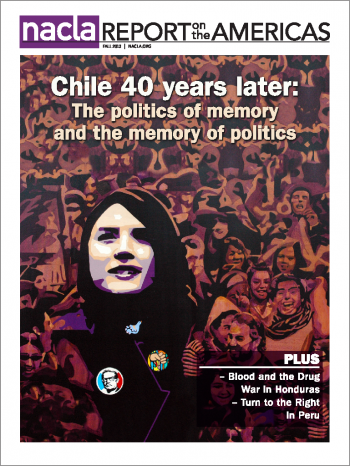Report
We who survived and found ourselves heading to exile took the opportunity to begin a new life, to come to know other realities and to embark on different paths to continue transforming the world. Observed from a distance of four decades, it’s a strange privilege that was not within the grasp of the thousands who were killed, disappeared, tortured or silenced.
There is a new politics in Chile that does not sideline social movements from political decision-making but rather works with and through the organization of such movements to build a truly “popular” electoral front—while challenging “Politics.”
Chile is neither democratic nor developed. It is an unjust country where citizens have been transformed into consumers, and whose rights now depend on their relative purchasing power. It is a country of workers who have been pushed into consumerism and individualism, overwhelmed and indebted.
Third World struggles formed the groundwork for the cultivation of an anti-racist feminist consciousness in the United States. In addition to crossing the borders of geography, U.S. Third World feminists utilized poetry—crossing the border of art and politics—in their efforts to build broad-based solidarities.
The urban poor tend to be taken up as victim of neoliberal reforms and repositories of memories of past political struggles. Yet, we might ask how such characterizations rely on and sustain a notion of a homogenous urban poor. With such a notion, it may be difficult to appreciate the finer, smaller struggles that go on every day.
Many politicians on the left continue to frame Mapuche concerns in terms of social class, perhaps admitting a need for increased access to land, education, healthcare, and so forth, but conceptualizing all of these as socioeconomic problems, thereby denying the longer history of colonial dispossession.
Our goal in this issue is not to relive the hopes of the days prior to the coup or to re-experience the times of terror following it, but to understand the impact that these events have made on how we now experience neoliberal constraints and practice progressive politics; we hope to trace what is different because of those events.
The transition period that led from military to civilian rule was predicated on maintaining “a certain silence.” Thus, the return of the student movement since 2006 and its ability to forge links back to the Allende period is a critical development.

